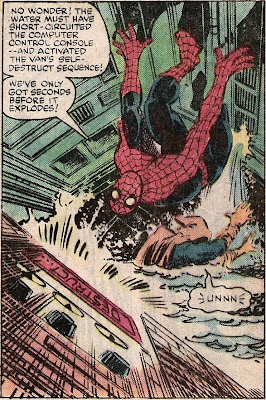
Plot: Roger Stern
Script: Tom DeFalco
Pencil breakdowns: Ron Frenz
I don't have the preceding issue of this, however as the episode opens with Spider-Man and Hobgoblin lying amidst the flames of a burning building, I found that I didn't really need to have read it. In fact, thanks to the Hobgoblin's helpful exposition, I didn't even need a proper recap-panel.

That's pretty smart scripting there from Tom DeFalco. Clearly he prefers dialogue over narration any day of the week, as the rest of these two super-beings' battle proves.
The Hobgoblin continues:



Well, y'know, I'm not really being fair am I? I mean, an informative paraphrase is just the way in which super-heroes and super-villains always talk, isn't it?

When even something as visual as the van's eventual crash into the Hudson river is being explained out loud by Spidey, you have to just sit back and accept that this is part comic-book, part radio-show – which is something that I can hardly criticise.

That's a pretty serious design-flaw that van has. In fact, it brings all the action to a close when we're still only at the centre-staples.
The second half of the issue carries an air of winding continuity down, for reasons I'll touch on in a moment. After the Hobgoblin's defeat, Spidey reports back to his publishing nemesis J Jonah Jameson, has a great argument with him, learns that JJJ has resigned, and watches him hand over editorship of The Bugle to Robbie, who I guess had been waiting for this.
After that there's a second epilogue with Harry Osborn, which leads into a third one with Spidey getting abducted by a giant UFO in Central Park. With a bit of tweaking, this was the only part of the issue to my knowledge that got reprinted here in the UK. (in Spider-Man Weekly #630)
That's because it led into the landmark Marvel Super Heroes Secret Wars series, which took Marvel US an entire year to publish, and introduced his new black costume.
It was an odd time. I first got into collecting US Spider-Man during that very year (I got this as a back-issue) and like so many other readers, found myself reading Parker's adventures on the Beyonder's planet simultaneously with his adventures on Earth set some time afterwards. Despite there apparently being an entire year's disparity between them, it all made good sense and for me demonstrated one of the shared Marvel universe's greatest abilities.
Today I'm still impressed at Marvel's quiet self-assurance back then that its readers would still be following their titles a whole twelve months further down the line to see things tie-up. From the opposite perspective, I'm also pleased that they believed I would remember what I'd read a year ago.
It's probably a big reason why I still expect today's storytellers to treat their audience with the same respect.
(sometimes available here)
Labels: comics


 :)
:)

 Brett
Brett Random Dave
Random Dave Scottish Dave
Scottish Dave Frank
Frank Greg
Greg Herschel
Herschel Jacob
Jacob Jean
Jean Joe
Joe Jonathan
Jonathan Melissa
Melissa Melva
Melva Paul
Paul The Reynolds
The Reynolds Rhett
Rhett Sara
Sara Sarah
Sarah Tim
Tim My church
My church
0 comment(s):
Post a Comment
<< Back to Steve's home page